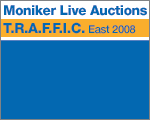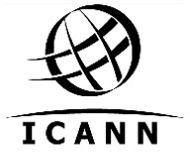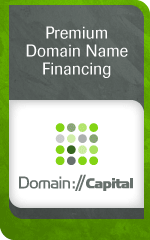|
The fact that .info and .biz
have had relatively low adoption rates compared to the
original gTLDs, .com, .net and .org,
tells me that there is not enough public demand or
recognition of new extensions to roll more out at this
point in time (even a few more, let alone hundreds
more).
I can only see a flood of new
gTLDs creating a lot of confusion among Internet
users, with few benefits to anyone other than ICANN (who
would reportedly charge anywhere from $39,000 to $390,000
for the rights to operate a new TLD) and perhaps some
registrars. An interesting conversation on this topic,
initiated by blogger Michael Berkens, is currently
underway at TheDomains.com.
|
While we are on the
topic of domain extensions and confusion, I have
to comment on an item in a newsletter I got this
morning from domain registrar Encirca.com.
It said "EnCirca introduces |
|
28 new extensions
for you to register, such as us.com, eu.com,
de.com, and uk.com..."
These are NOT new extensions but because of
this kind of misleading marketing I have had
readers argue vociferously with me that they are.
These are .com domains period - nothing at
all new about them. What Encirca and many other
registrars are selling are sub-domains of
names like us.com and eu.com that are marketed by CentralNic.
Now, I have no
problem with the CentralNic business model (they
do not make any claims to be providing new
extensions), but I do have a problem with
registrars leading the public to believe they are
getting something they are |

|
|
not. I've had too
many excited newbies ask me how much their domains
in these "new" extensions are worth.
They think they have discovered great keywords in
valuable new extensions and are quite distressed
when I have to tell them otherwise. Those that
bought with resale in mind will be sorely
disappointed because there is virtually no
aftermarket interest in sub-domains, aside from
the occasional rare bolt of lightning from a blue
sky. We will actually be reporting one of those in
our next weekly sales column (a name sold at
Sedo), but that doesn't change the fact that you
will almost certainly go broke investing in
sub-domains if you are buying them for PPC or
resale purposes. |
|
One
other note today - if you drop by Michael
Berkens's site mentioned in our first item above,
check out another
hot topic - whether or not employees
of aftermarket auction houses should be allowed to
bid against their company's own customers. This
discussion was triggered by a thread at the NamePros.com
forum about aftermarket sales reported by DN
Journal that |
|

|
Andrew Allemann followed
up on Sunday by posting some additional background
information on auction house policies at DomainNameWire.com. His post, like Michael's, has drawn dozens
of reader comments on practices that many consider
to be unethical.
I think the auction
venues would be better served if they prohibited
their employees from bidding in the company's
auctions (as many, including Sedo.com, SnapNames.com
and Bido.com currently do). You can see
by reading the blog |
|
and
forum posts that a large percentage of bidders
will, rightly or wrongly, question the fairness of
auctions where company employees are free to bid
against them. Since this is an important issue
with domain buyers I think that, at the very
least, every auction venue should prominently and
clearly post their policy on employee bidding so
their customers can choose for themselves whether
to play by those ground rules or take their
business elsewhere.
(Posted
June
23, 2008) |
|












